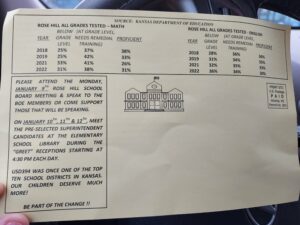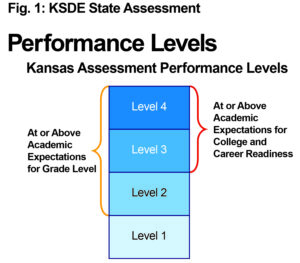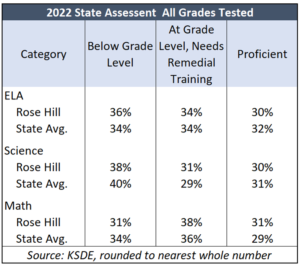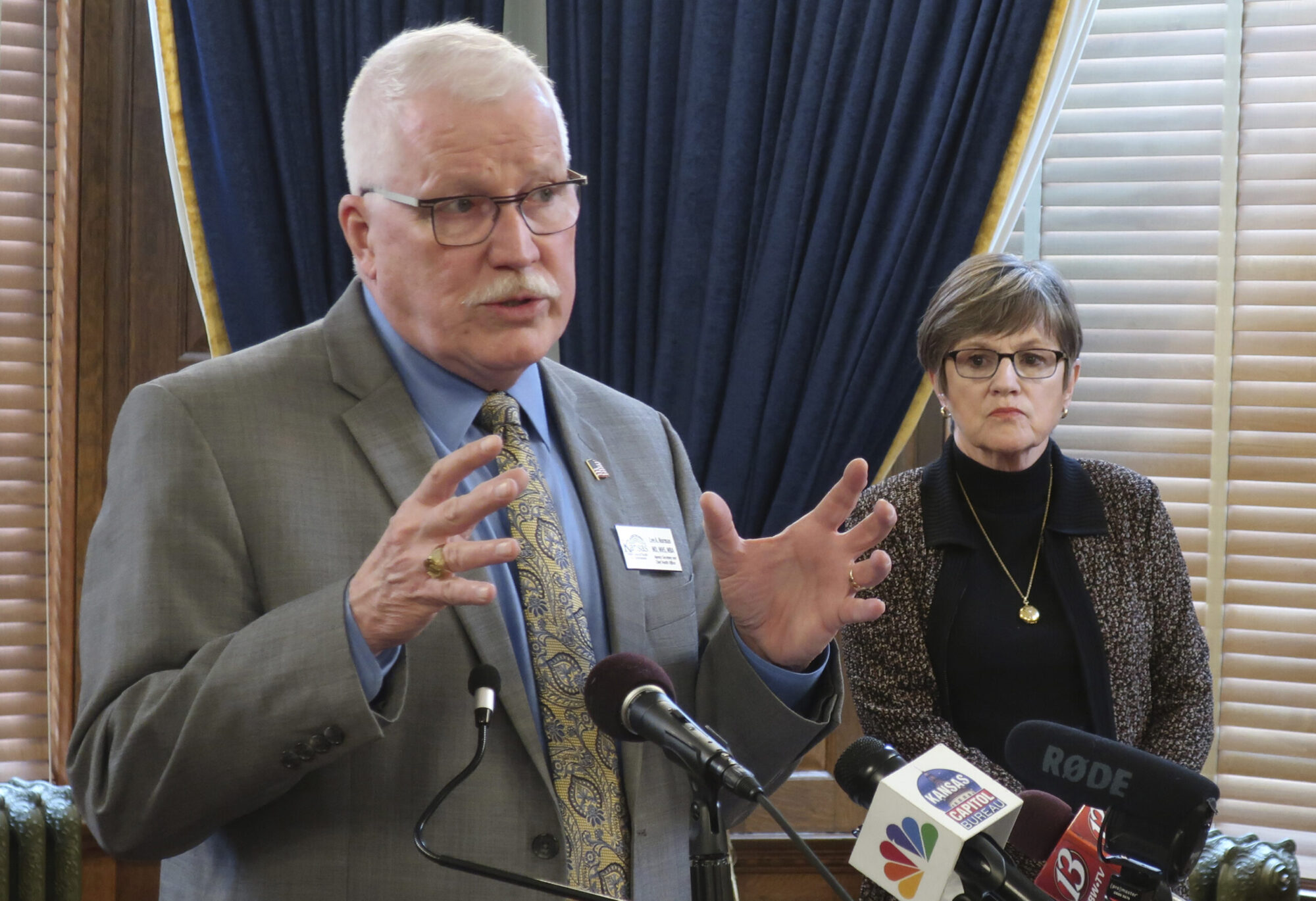Frustrated with district officials’ refusal to acknowledge a student achievement crisis, a group of Rose Hill parents mailed a postcard to residents showing the tragic truth – more students are below grade level in math and English language arts than are proficient. When  parents asked the district for answers at the January 9 board meeting, Superintendent Randall Chickadonz gave parents the impression that the postcard wasn’t accurate and tried to excuse away their concerns.
parents asked the district for answers at the January 9 board meeting, Superintendent Randall Chickadonz gave parents the impression that the postcard wasn’t accurate and tried to excuse away their concerns.
But once his statements were questioned by The Sentinel, Chickadonz responded in an email, saying, “I have not verified all the data on the postcard, but I do believe the 2022 scores are accurate.”[i]
Refusal to acknowledge the student achievement crisis is not unique to USD 394 Rose Hill, nor is it a new phenomenon. It’s a pattern across the state that starts with the Kansas Department of Education and the State Board of Education.
A litany of examples is documented in Giving Kids a Fighting Chance with School Choice, published last year by Kansas Policy Institute, which owns the Sentinel, and also in a documentary by the same title. For example,
- Deputy Commissioner of Education Brad Neuenswander told Kansas Policy Institute that “Level 1 is the only assessment category that defines students as not yet ready for
 college and career.” But just three days prior, he responded to a parent’s question asking if Level 2 is considered on track for college and career, writing, “No. Levels 3 and 4 indicates [sic] that they are on track for college level work.”
college and career.” But just three days prior, he responded to a parent’s question asking if Level 2 is considered on track for college and career, writing, “No. Levels 3 and 4 indicates [sic] that they are on track for college level work.” - KASB Associate Executive Director of Advocacy Mark Tallman tried to deflect from Kansas having a large portion of students below grade level in a legislative hearing, saying that the state assessment test doesn’t identify grade-level performance. State officials reworded definitions so that grade level isn’t mentioned, but Level 1 was clearly below grade level when the standards were introduced in 2016.
‘Rose Hill being better than the state average’ means ‘not as bad’
School officials routinely use the ‘we’re better than the state average’ claim to deflect attention from bad outcomes, as Chickadonz told Rose Hill parents. But even if true, a more honest statement would be, ‘we’re not as bad as the state average.’
 Chickadonz is technically correct about math scores but not English language arts or Science.
Chickadonz is technically correct about math scores but not English language arts or Science.
For ELA, only 30% of Rose Hill students are proficient, and the state average is 32%. Rose Hill trails the state average in Science by one point (30% vs. 31%). The district is two points better in Math, but excusing (almost bragging) about 31% proficiency is a bleak view of student potential and an insult to parents and students.
It’s also another indication that parents cannot count on the education system to address the student achievement crisis in Kansas. Too many education officials place a higher priority on preserving the system than on what’s best for students.
Their ‘system over students’ attitudes won’t change without legislative intervention. Money is the only thing that gets the attention of most administrators, and that’s why money-follow-the-child legislation is needed in Kansas. Achievement is growing faster in states like Florida and Arizona, with robust school choice options, than the national average because competition forces school officials to ‘up their game’ to convince parents to stay in the public school system. While Florida and Arizona were improving, Kansas was going backward.
Outcomes for low-income students and minorities in Kansas are particularly appalling. Only 9% of low-income students are proficient in math. White students are five times more likely to be proficient than Black students (24% vs. 5%).
The Kansas GOP House and Senate leadership teams yesterday announced support for school choice legislation as part of their Better Way agenda for this year. We’ll look forward to Gov. Kelly’s State of State address to see if she’ll consider new approaches to the achievement crisis. Her speech was delayed due to a COVID infection – we wish her a speedy recovery – but using money as a proxy for supporting education doesn’t bode well for students. The money has grown exponentially over the last twenty years, but proficiency levels have dropped.
The battle to pass school choice legislation will be sadly ironic for the state home to Brown v. Board of Education. Former Arizona Governor Doug Ducey put it best in his reference to Brown v. Board of Education.
“Fifty years ago, politicians stood in the schoolhouse door and wouldn’t let minorities in. Today, union-backed politicians stand in the schoolhouse door and won’t let minorities out.”
__________
[i] Chickadonz took issue with ‘needs remedial training’ being part of the Grade Level definition, but the reference to remediation comes from the state board of education. In January 2016, it adopted a definition of a successful high school graduate as having “the academic preparation to be successful . . . without the need for remediation.” Since Level 2 is not on track for college and career, those students, by definition, need some degree of remediation.



